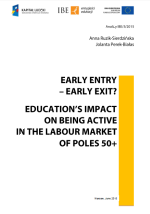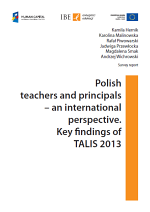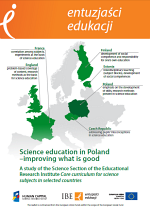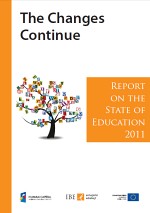Early entry – early exit? Education’s impact on being active in the labour market of Poles 50+
- Published on Wednesday, 17 June 2015 15:50
 Poland is an interesting case in Europe in terms of low employment of 50+, which defines the country as an early exit culture. In this paper, detailed retrospective data from the project Determinants of Educational Decisions - Household Panel Study (DED-HPS) are used to check the relation between the level of education and time of entering the labour market and inactivity versus activity of older generation 50+. The results based on the analysis of logistic regression show that the formal education level was an important predictor of inactivity while people with primary or secondary education are more likely to become inactive at older age than those with tertiary education. Participation in non-formal education significantly decreases chances of early retirement with a stronger effect for men. Odds of being inactive at older age are much higher for those who are disabled and longer tenure decreases odds of inactivity at older age. Including Interactions as an explanatory variable did not change the overall interpretation of the results.
Poland is an interesting case in Europe in terms of low employment of 50+, which defines the country as an early exit culture. In this paper, detailed retrospective data from the project Determinants of Educational Decisions - Household Panel Study (DED-HPS) are used to check the relation between the level of education and time of entering the labour market and inactivity versus activity of older generation 50+. The results based on the analysis of logistic regression show that the formal education level was an important predictor of inactivity while people with primary or secondary education are more likely to become inactive at older age than those with tertiary education. Participation in non-formal education significantly decreases chances of early retirement with a stronger effect for men. Odds of being inactive at older age are much higher for those who are disabled and longer tenure decreases odds of inactivity at older age. Including Interactions as an explanatory variable did not change the overall interpretation of the results.
The Download the analysis [pdf, 0.6 MB]
.
Polish teachers and principals – an international perspective. Key findings of TALIS 2013
- Published on Wednesday, 20 May 2015 13:00
 An interim report from the second round of the Teaching and Learning International Survey TALIS 2013 - an international study focusing on the working conditions of teachers, their beliefs about teaching, and their teaching and learning environment at schools.
An interim report from the second round of the Teaching and Learning International Survey TALIS 2013 - an international study focusing on the working conditions of teachers, their beliefs about teaching, and their teaching and learning environment at schools.
TALIS aims to provide information about teachers and teaching, including data for international comparisons of educational systems. It focuses on such issues as professional development opportunities, teaching beliefs and practices, teacher performance appraisal and feedback from principals and colleagues as well as other issues relevant to leadership and school climate. An analysis of these measures creates grounds for the comparison of countries facing similar challenges, facilitates tapping into various experiences and formulating conclusions on the impact of the policy towards teachers on the learning environment at schools.
This report is an interim analysis of data gathered during the survey and, therefore, has a purely descriptive character. While reading the report, please keep in mind that TALIS methodology is driven by declarations of teachers and school principals that form a picture of the broadly interpreted working conditions of teachers seen from their perspective. It should also be stressed that being an international survey, TALIS creates grounds for cross-country comparisons and features standardised questions, some of which fail to accurately reflect the Polish reality.
Data presented in this report mainly concern lower secondary school teachers and principals. This is due to the fact that lower secondary school teachers and principals are the basic unit of the TALIS analysis design. School surveys focusing on other ISCED levels were optional. Also, a much wider reference for lower secondary school data is available. It is clearly stated whenever analysed data are relevant to primary and upper secondary schools.
We hope that findings from TALIS will help identify strengths of teachers and principals and pinpoint areas which are still in need of development.
The Download the report [pdf, 1 MB]
.
Core curriculum for science subjects in selected countries - brochure
- Published on Tuesday, 24 February 2015 01:35
 Experts at the Educational Research Institute compared the Polish science core curriculum with its equivalents in five European countries: the Czech Republic, Estonia, Finland, France and England. The aim of the comparative analysis was to examine whether teaching scientific reasoning skills and the scientific method occupies a similar position and is assigned the same high priority across the countries.
Experts at the Educational Research Institute compared the Polish science core curriculum with its equivalents in five European countries: the Czech Republic, Estonia, Finland, France and England. The aim of the comparative analysis was to examine whether teaching scientific reasoning skills and the scientific method occupies a similar position and is assigned the same high priority across the countries.
The comparison also aimed at identifying the similarities and differences between the documents which might inspire future changes in the Polish document.
The selection of the countries was motivated, among other things, by students' skill level in reasoning in natural sciences in the PISA 2006 survey. The countries selected had either average results higher than Poland (Finland, Estonia, England, the Czech Republic) or similar, but significantly higher in indentifying scientific issues and in interpretation and acting on scientific results and evidence (France).
Download the brochure [pdf, 1.2 MB]
.The Changes Continue. Report on the State of Education 2011
- Published on Monday, 16 February 2015 20:46
 “The Changes Continue” is the second report from a series of reports on the state of education prepared by the Educational Research Institute. The report contains a new regular part in which updated information on trends in education is collated from different sources accompanied by a chapter devoted to changes in law which were introduced in the year prior to the publication of this report – 2011.
“The Changes Continue” is the second report from a series of reports on the state of education prepared by the Educational Research Institute. The report contains a new regular part in which updated information on trends in education is collated from different sources accompanied by a chapter devoted to changes in law which were introduced in the year prior to the publication of this report – 2011.
Compared to 2010 report more attention was paid to vocational and higher education - it was a year of significant legislative changes in both areas. The end of school year 2011/2012 was followed by significant changes in vocational schools culminating in the introduction of the new, long-anticipated core curriculum for vocational education.
Changes in higher education were introduced on 1 October 2011 through the higher education act amendment of March 2011. Thanks to National Qualification Frameworks in Higher Education, which have been in preparation since 2006, universities have gained more autonomy in the development of their curricula. They can plan the courses they offer independently, determining the name and curriculum as well as the expected learning outcomes. These changes occur at a crucial moment for universities as they have to cope with the effects of population decline and consider their offer and strategies for development.
The Download the report [pdf, 17MB]
.






